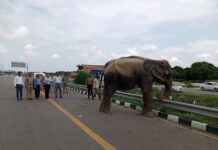(Juhi Aishwary, Journalist): A day after former Congress president Rahul Gandhi took a dig at the NITI Aayog for having predicted earlier that there won’t be any COVID-19 cases after May 16, he hit out at the Union government again on Saturday. He said that the economic stimulus package that the prime minister had announced and which the minister of finance has been detailing over the last three days was merely a package of loans that will not provide any immediate relief to many migrant laborers and farmers severely suffering from the coronavirus-induced lockdown.
“Our people need money. The Prime minister should reconsider this package. Modiji should believe direct cash transfer, 200 working days under MNREGA, money for farmers, because they’re the long run of India,” Gandhi said while proposing once more an immediate cash transfer scheme like NYAY that his party had promised during the overall elections last year. He said that only a proposal like Nyuntam Aay Yojana, or NYAY, which presented annual income support of Rs 72,000 to the poor will help the poor tide over this crisis.
On Friday, whilst the amount of COVID-19 cases continued to point out spikes, Gandhi posted a graph that the NITI Aayog had released to casually claim that the lockdown will put an end to infections.
Gandhi has been saying that the lockdown was merely a “pause button” to hamper the speed of infections which the epidemic had to be contained through a two-fold long term strategy that involved increased testing, revamping of the country’s public health care, and increased government spending within the social and financial sectors.
While expressing concerns about the government’s apparent lack of preparedness, the Congress leader on Saturday said that it’s not a nasty step, but, the foremost important thing immediately, is that we put money directly into the hands of the poor people. As many experts have already acknowledged, Gandhi said that the package does do enough to increase demand and unless the government ensures that, it will be very difficult for India to deal with the economic fallouts of the pandemic.
Worse yet to come if the government doesn’t improve
Addressing regional media by means of video conferencing this morning, Gandhi said that it had been heartbreaking to ascertain people “walking on the highways with no food, no water” and MSMEs taking the utmost blow because of the lockdown.
He said about the financial package while emphasizing that the government’s primary “duty” should be to protect the most vulnerable.
“The Government of India shouldn’t worry about what the foreigners are getting to say, what the agencies are going to say. The Government of India should have faith in our small and medium businesses should have faith in our people, in our farmers, faith within the people…” he said, adding that the aftermath of the lockdown could be so bad that it is “going to overshadow the disease of COVID”.
On the lifting of the lockdown, the Wayanad MP said that the govt. shouldn’t be treating it as an “event”, and will consider it as a “process” which has to be handled cleverly and sensitively.
Need for greater transparency
Later within the day, Gandhi also released a press release that highlighted that the govt. needed to figure in a more transparent way.
“Although the Prime Minister slowly announced an economic stimulus package on May 12, 2020, the precise details and thus the contours of the package and its true extent aren’t yet clear to the public and are rather opaque. The Finance Minister’s daily press conferences on the issue are only adding to the perplexity, making India increasingly skeptical and restless”, he said.
He said that like the migrant laborers, farmers too have been facing an unprecedented crisis. Unseasonal rains and hailstorms have damaged their crops in many parts of India. The national lockdown has put a brake on the sale of the harvest at Minimum Support Price. GST continues to be forced on fertilizers, pesticides, and even agricultural equipment. Though global prices have crashed, the worth of diesel, which our farmers use across India, hasn’t seen any reduction. Yet aside from rehashing old schemes and making some advances against them, no concrete steps are taken to alleviate our farmers of their suffering.
He added that the MSMEs that make over 11 crore jobs have just been offered easy loans, which if they avail of can further trap them during a vicious debt cycle.
He then went on to release a group of recommendations that he claimed had been prepared through a consultative process within his party. They included an idea for income support for the poor, 200 days of MGNREGA work, wholesome food support to 11 crore people outside the general public Distribution Scheme (PDS), and financial support and subsidies to farmers, MSMEs, and little traders. He also said that a credit guarantee scheme with interest subsidy should be introduced for MSMEs, traders, and enormous industries. He urged that the retail supply chain should be restored immediately, apart from those located in hotspots, as a measure of relief for little shopkeepers.
Above all he said, migrant laborers should be treated with dignity and respect, and that the government was duty-bound to ensure their safe return to their homes, free of cost.





